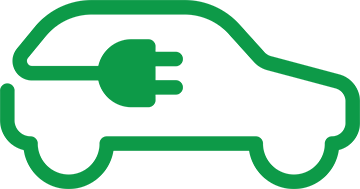
Have you ever pondered if EVs are faster and more powerful than ICE cars?
We have the answers! This article will compare EVs to traditional gas-powered vehicles. Ready to find out the difference? You may be astonished!
Electric vehicles vs petrol vehicles – what are the key differences?
Electric vehicles (EVs) differ from petrol vehicles in efficiency, emissions, and maintenance costs. Let's compare!
EVs:
- Zero greenhouse gases and air pollutants to operate.
- High energy efficiency due to braking regeneration and powertrain.
- Lower maintenance costs with fewer moving parts.
Petrol:
- Contribute to air pollution through exhaust.
- Internal combustion engine only uses a fraction of fuel energy for motion.
- Higher maintenance costs due to complex engine systems (made up of thousands of parts).
Fast EVs versus high-performance ICE cars. How do they stack up?
It’s time to take a lookie-look and how Fast EVs compare with High-performance ICE Cars—what's the difference?
There are some who go so far as to say that powerful EVs redefine speed and efficiency.
Here’s why: Electric motors in EVs provide instantaneous torque, which results in impressive acceleration and power. ICE cars generate power through controlled explosions of fuel, giving similar performance. Some EVs can match the top speeds of high-performance ICE cars. EVs are equipped with single-speed transmissions, which makes them more efficient, with very smooth power delivery.
They also emit zero tailpipe emissions—reducing carbon footprint. Maintenance costs for EVs are lower too. ICE cars have multi-gear transmissions to maximize performance, but move through gears and are far less smooth in power delivery than EVs, plus they emit exhaust gases.
It's a debate whether driving an EV can match the experience of an ICE vehicle. Technology and improvements in EVs suggest electric cars may soon outperform ICE cars. Stay informed on the latest developments in EV tech to experience the future of high-speed and eco-friendly transportation!
Are EVs as fast as fuel cars?
EVs have been making waves with their amazing performance. Can they go as fast as gas-powered cars? It all depends on the power of electric motors compared to internal combustion engines.
EVs stand out for their instant torque. They can accelerate quickly, without having to rev up like gas cars. EVs can reach their max torque almost right away and keep up with traditional cars.

Electric cars are special in that they can achieve power efficiently with one gear. Gas-powered cars need multiple gears to make the most of their engine at different speeds. EVs save energy since they don't need those extra gears, demonstrate smooth power delivery, and as a result can go faster.
It's worth noting that although EVs can match gas-powered cars in speed, they may not be able to last as long in long distance races due to battery issues. However, this is improving.
Efficiency, Torque and Weight
Electric vehicles are known for their efficiency, torque, and instant power from zero mph. This makes them feel more powerful and faster than most (non-performance) ICE cars.
Efficiency: EVs convert electrical energy from the battery to mechanical energy, resulting in less energy loss. This is in contrast to ICE cars, which have lower efficiency due to their multiple steps (gears) of chemical energy conversion.
Torque: EVs generate instant torque when the accelerator is pressed, while ICE cars require multiple gears for power delivery at different speeds.
Weight: EVs motors are lighter as they don't need heavy components like an internal combustion engine. However, where they gain in the engine weight department, they make up for it with a battery. Currently batteries can be heavy… and often make EVs slightly (to significantly) heavier than their ICE counterparts. A heavier battery does impact overall efficiency and handling.
History: Inventors like Thomas Davenport and Robert Anderson created the first electric motor in the early 19th century. However, it was not until almost 100 years later, in the late 20th century that electric vehicles became popular due to battery technology advancements and environmental concerns. Now, with continuous innovations, EVs are a sustainable alternative to ICE cars.
Frequently Asked Questions
Are electric vehicles (EVs) more powerful than internal combustion engine (ICE) cars?
No, EVs are not necessarily more powerful than ICE cars. The power output of an EV depends on its motor and battery capacity. While EV models tend to offer impressive acceleration and torque across the board, not all EVs are designed for high performance. In both EVs and ICE cars there is a range of low- to high-performance vehicles along a continuum.
Are EVs faster than ICE cars?
In general, many high-performance EV models can achieve faster acceleration than traditional ICE cars due to the instant torque provided by electric motors (without the need to cycle up through gears as ICE cars do). However, top speeds of EVs may be limited compared to some high-performance ICE cars.
Do EVs have better overall power delivery compared to ICE cars?
Yes, EVs offer better power delivery due to instant torque and smooth acceleration. Electric motors provide power more efficiently without the need for gear changes, resulting in a seamless and very enjoyable driving experience.
Are there any advantages of ICE cars in terms of power and speed?
ICE cars can still have advantages in terms of top speed, especially in high-performance categories. However, in terms of immediate power delivery and low-end torque, EVs have the edge.
Can EVs match the power and speed of sports cars?
Yes, many manufacturers are producing electric sports cars capable of matching or even surpassing the power and speed of traditional sports cars. The advancements in EV technology continue to push the boundaries of performance.
Are there any limitations to EV power and speed?
While EV technology is rapidly improving, limitations can still exist in terms of battery capacity and charging infrastructure. Longer durations of high-speed driving or aggressive acceleration can impact the range of an EV.

